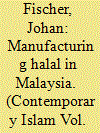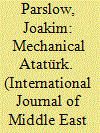| Srl | Item |
| 1 |
ID:
145666


|
|
|
|
|
| Summary/Abstract |
In Arabic, halal literally means ‘permissible’ or ‘lawful’. Halal is no longer an expression of an esoteric form of production, trade and consumption, but part of a huge and expanding globalized market in which certification, standards and technoscience play important roles. Over the past three decades, Malaysia has become a world leader in the global expansion of halal markets. This has come about in large part because the state and government of Malaysia have taken on the role of halal-certifying authority within the country. In effect, it has certified, standardized and bureaucratized halal production, trade and consumption. Based on fieldwork in Malaysia, this article explores how manufacturing companies understand and practise halal certification, standards and technoscience. I argue that while existing studies of halal overwhelmingly explore micro-social aspects such as the everyday consumption among Muslim groups, ‘the bigger institutional picture’ that frames such consumption production and regulation are not well understood. By studying halal production, I provide an ethnography of the overlapping technologies and techniques of production and regulation that together warrant a product as ‘halal’ and thereby help to format the market.
|
|
|
|
|
|
|
|
|
|
|
|
|
|
|
|
| 2 |
ID:
182840


|
|
|
|
|
| Summary/Abstract |
Turkey's 1960 military coup d’état was received by Kemalists in the courts, bureaucracy, and universities as an opportunity to reinvigorate Atatürk's ideal of a centralized and rationally organized state. This article investigates how a handful of avant-garde thinkers sought to ride the post-1960 wave of reformism by promoting a techno-utopian approach to governance through publications and seminars aimed at state leaders and intellectuals. Cybernetics, they argued, offered a paradigm of adjudication and administration unblemished by association with the ascendant ideologies of the Cold War, whether socialist or conservative, and was fully in keeping with Kemalism. I argue that, although it remained largely at the stage of fantasy, Turkish cybernetics ultimately served as a set of metaphors with which conservative state thinkers from different political camps found common ground, facilitating the shift that occurred within the state during the 1970s away from the rights-based pluralism of the Constitution of 1961 and toward an effort to de-radicalize Turkish society, if necessary through violence.
|
|
|
|
|
|
|
|
|
|
|
|
|
|
|
|